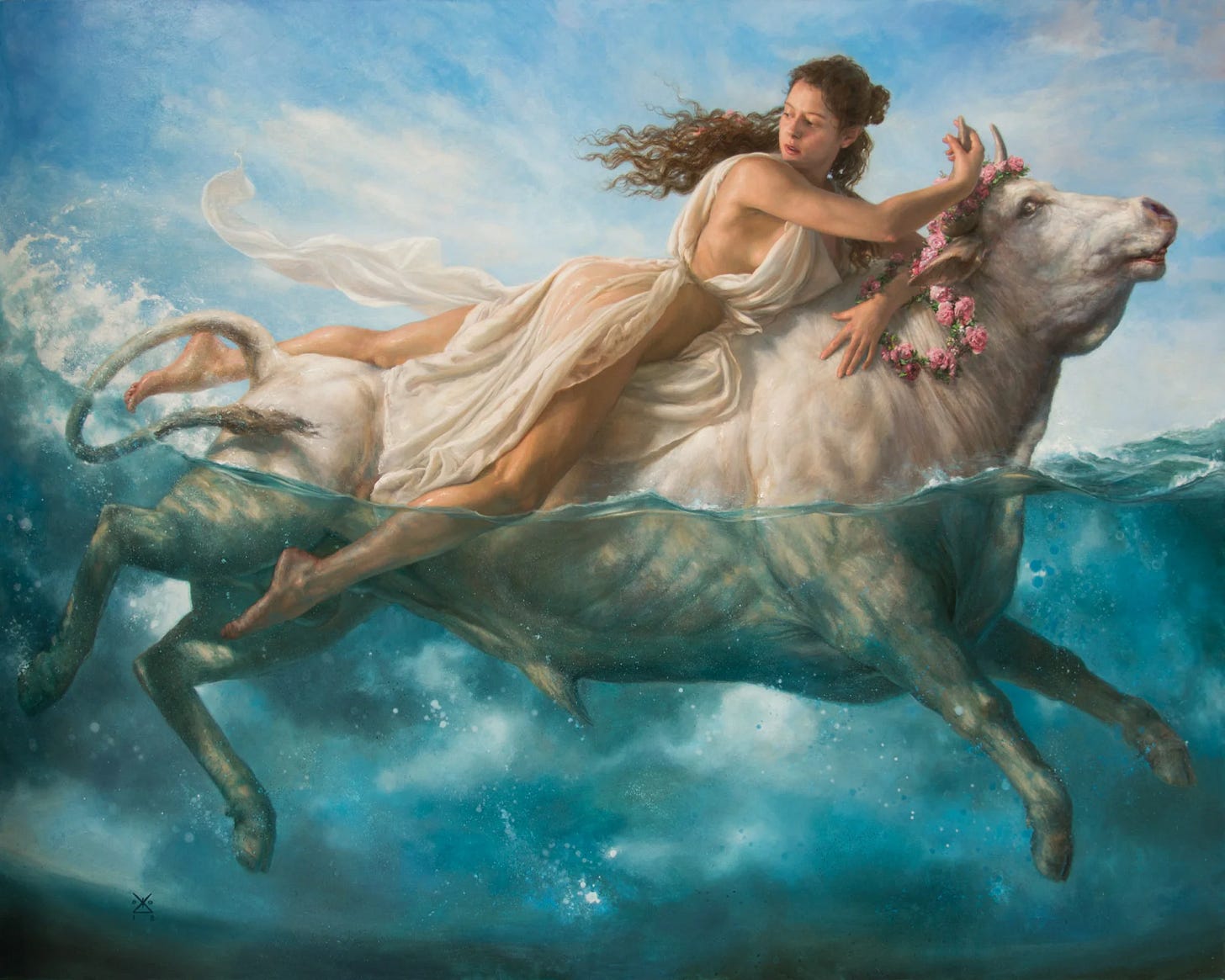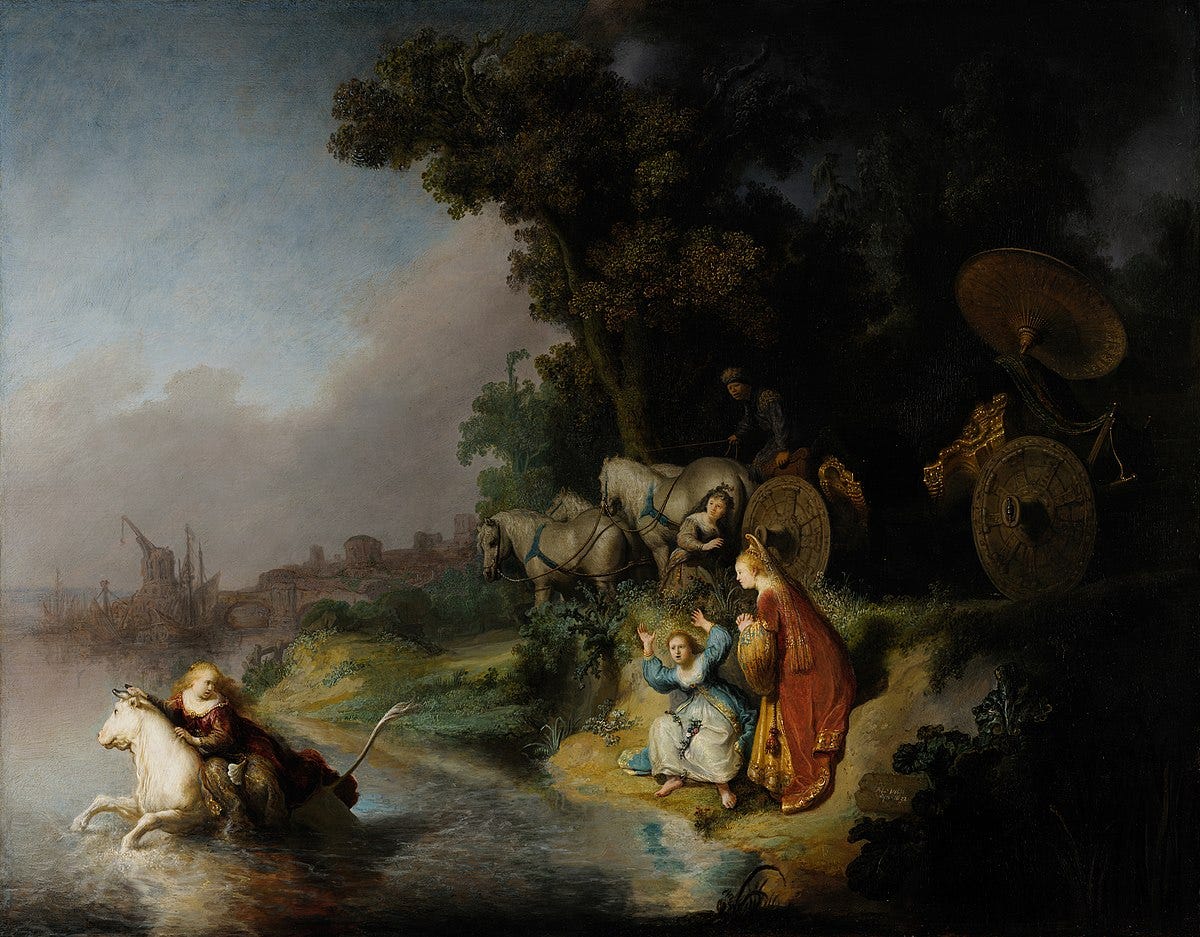Europa: The Girl Behind Europe
Have you ever heard of the woman behind the name Europe? Yes, we're talking about the continent! It's the beautiful girl named Europa whose story influenced many artworks and a continent ✨
This is the story of Europa, a Phoenician princess who was kidnapped by Zeus, the god of gods. What makes Europa's story so special is that an entire continent is named after her. The story has inspired many artists, including those of the Renaissance, and their works often depict Europa and her abduction.
One day Zeus is sitting in the sky and watching the Earth from above. Meanwhile, the beautiful Europa wakes up early because her dreams have made her restless. In her vision, two continents, personified as women, vie for possession of Europa. Asia claims maternal rights, while another unnamed continent asserts Zeus's offer of Europa's servitude. Feeling unsettled, Europa seeks solace by the sea with her friends, fearing the dawn's dreams may hold truth.
From his heavenly perch, Zeus' heart was pierced by Cupid's arrow, igniting a love for Europa. The god transforms into a bull and appears before the young girl, whose beauty captivates her. She approaches and caresses the bull, enchanted by its sweet melody. Europa, drawn by curiosity and fascination, climbs onto its back.
The bull begins to run towards the sea with Europa on his back. As he goes, he brings the waves with him. They are accompanied by the sea gods Nereids, Tritons and even Poseidon, the god of the sea, Zeus' brother, riding on dolphins. Across the vast expanse of the Aegean, they journeyed, until at last, they reached the shores of the island of Crete. There, Zeus revealed his true form to Europa, and she beheld the god of thunder and lightning in all his splendour. In time, Europa became queen of Crete, and Zeus bestowed upon her many gifts and honours.
The Book of the Week 📚
Edith Hamilton's Mythology is a classic work in the field of mythology. Originally published in 1942, it has since become one of the most popular and widely read collections of Greek, Roman, and Norse myths. The book is a great start if you’re new to mythology.
The Abduction of Europa by Rembrandt
One of the most famous depictions of Europa and Zeus scene can be recognized in Rembrandt’s “The Abduction of Europa.” Throughout his long career, Rembrandt rarely painted mythological subjects. Here he uses dramatic gestures and visual effects to convey the story.
Rembrandt's composition is dynamic and captures the moment of action. The bull, representing Zeus, dominates the foreground, with Europa gracefully draped across its back. The figures are arranged diagonally across the canvas, creating a sense of movement and tension. The viewer's eye is drawn towards Europa's face, which displays a mix of fear, surprise, and resignation.
Is it Political? 🤔
The painting can be interpreted symbolically. Europe's abduction is often seen as a metaphor for the subjugation of weaker nations by more powerful ones.
So, it may reflect the political tensions of Rembrandt's time, when the Netherlands was threatened by various foreign powers.
Rembrandt was a master of chiaroscuro, the use of strong contrasts between light and dark. In "The Abduction of Europa," he employs this technique to create depth and drama. The light falls on Europa's face, emphasizing her emotional turmoil and drawing attention to her plight. Meanwhile, the background is shrouded in darkness, adding to the sense of mystery and danger surrounding the scene.
The Birth of Europe
When Europa died, Zeus (Jupiter in Roman mythology) is said to have transformed her into a constellation. He took the form of a white bull. It is believed that the constellation of the Bull is the form of Zeus. Today, one of Jupiter's moons is called Europa, and it is special because it is believed to have water on it. Later, the name Europa was given to the continent we know today as Europe.
Explore the World of Mythology!
Did you hear? 👀 These are the whispers of Zeus! He’s waiting for you to listen to his stories on Piri Guide. He’s quite eager. And he is not alone; Zeus is with his family, the mighty Olympian gods!
No, don’t leave yet!
Don’t forget to follow our social media accounts!
Instagram: @mypiriguide
Twitter / X: @mypiriguide
Tiktok: @piriguide
Wishing everyone a nice weekend! See you next week! 👋🏼






